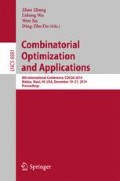Abstract
Many large-scale real-world networks are well-known to have the power law distribution in their degree sequences: the number of vertices with degree i is proportional to \(i^{-\beta }\) for some constant \(\beta \). It is a common belief that solving optimization problems in power-law graphs is easier. Unfortunately, many problems have been proven NP-hard, along with their inapproximability factors in power-law graphs. Therefore, it is of great importance to develop an algorithm framework such that these optimization problems can be approximated in power-law graphs, with provable theoretical approximation ratios.
In this paper, we propose an algorithmic framework, called Low-Degree Percolation (LDP) Framework, for solving Minimum Dominating Set, Minimum Vertex Cover and Maximum Independent Set problems in power-law graphs. Using this framework, we further show a theoretical framework to derive the approximation ratios for these optimization problems in two well-known random power-law graphs. Our numerical analysis shows that, these optimization problems can be approximated into near 1 factor with high probability, using our proposed LDP algorithms, in power-law graphs with exponential factor \(\beta \ge 1.5\), which belongs to the range of most real-world networks.
This work was finished when Yilin Shen was with CISE Department, University of Florida.
Access this chapter
Tax calculation will be finalised at checkout
Purchases are for personal use only
References
Aiello, W., Chung, F., Lu, L.: A random graph model for massive graphs. In: STOC ’00, pp. 171–180. ACM, New York (2000)
Aiello, W., Chung, F., Lu, L.: A random graph model for power law graphs. Exp. Math. 10, 53–66 (2000)
Albert, R., Jeong, H., Barabasi, A.L.: The diameter of the world wide web. Nature 401, 130–131 (1999)
Bornholdt, S., Schuster, H.G. (eds.): Handbook of Graphs and Networks: From the Genome to the Internet. Wiley, New York (2003)
Chung, F., Lu, L.: Connected components in random graphs with given expected degree sequences. Ann. Comb. 6(2), 125–145 (2002)
Dinur, I., Safra, S.: On the hardness of approximating minimum vertex cover. Ann. Math. 162, 439–485 (2005)
Eubank, S., Kumar, V.S.A., Marathe, M.V., Srinivasan, A., Wang, N.: Structural and algorithmic aspects of massive social networks. In: SODA ’04, pp. 718–727. Society for Industrial and Applied Mathematics, Philadelphia (2004)
Faloutsos, M., Faloutsos, P., Faloutsos, C.: On power-law relationships of the internet topology. In: Proceedings of the Conference on Applications, Technologies, Architectures, and Protocols for Computer Communication, SIGCOMM ’99, pp. 251–262. ACM, New York (1999)
Ferrante, A., Pandurangan, G., Park, K.: On the hardness of optimization in power-law graphs. Theoret. Comput. Sci. 393(1–3), 220–230 (2008)
Gkantsidis, C., Mihail, M., Saberi, A.: Conductance and congestion in power law graphs. SIGMETRICS Perform. Eval. Rev. 31(1), 148–159 (2003)
Halldórsson, M., Radhakrishnan, J.: Greed is good: approximating independent sets in sparse and bounded-degree graphs. In: Proceedings of the Twenty-sixth Annual ACM Symposium on Theory of Computing, STOC ’94, pp. 439–448. ACM, New York (1994)
Janson, S., Luczak, T., Norros, I.: Large cliques in a power-law random graph(2009)
Karakostas, G.: A better approximation ratio for the vertex cover problem. ACM Trans. Algorithms 5(4), 41:1–41:8 (2009)
Pandurangan, G.: (2006). https://sites.google.com/site/gopalpandurangan/papers-by-date
Redner, S.: How popular is your paper? an empirical study of the citation distribution. Eur. Phys. J. B - Condens. Matter Complex Syst. 4(2), 131–134 (1998)
Shen, Y., Nguyen, D.T., Xuan, Y., Thai, M.T.: New techniques for approximating optimal substructure problems in power-law graphs. Theoret. Comput. Sci. 447, 107–119 (2012)
Vazirani, V.V.: Approximation Algorithms. Springer-Verlag New York Inc., New York (2001)
Acknowledgment
This work is partially supported by the NSF CCF-1422116 and DTRA YIP HDTRA-1-09-1-0061 grants.
Author information
Authors and Affiliations
Corresponding authors
Editor information
Editors and Affiliations
Rights and permissions
Copyright information
© 2014 Springer International Publishing Switzerland
About this paper
Cite this paper
Shen, Y., Li, X., Thai, M.T. (2014). Approximation Algorithms for Optimization Problems in Random Power-Law Graphs. In: Zhang, Z., Wu, L., Xu, W., Du, DZ. (eds) Combinatorial Optimization and Applications. COCOA 2014. Lecture Notes in Computer Science(), vol 8881. Springer, Cham. https://doi.org/10.1007/978-3-319-12691-3_26
Download citation
DOI: https://doi.org/10.1007/978-3-319-12691-3_26
Published:
Publisher Name: Springer, Cham
Print ISBN: 978-3-319-12690-6
Online ISBN: 978-3-319-12691-3
eBook Packages: Computer ScienceComputer Science (R0)

